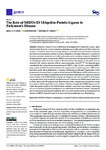The Role of NEDD4 E3 Ubiquitin–Protein Ligases in Parkinson’s Disease
| dc.contributor.author | Conway, JA | |
| dc.contributor.author | Kinsman, G | |
| dc.contributor.author | Kramer, ER | |
| dc.date.accessioned | 2022-04-04T12:42:19Z | |
| dc.date.issued | 2022-03-14 | |
| dc.identifier.issn | 2073-4425 | |
| dc.identifier.issn | 2073-4425 | |
| dc.identifier.other | 513 | |
| dc.identifier.uri | http://hdl.handle.net/10026.1/18993 | |
| dc.description.abstract |
<jats:p>Parkinson’s disease (PD) is a debilitating neurodegenerative disease that causes a great clinical burden. However, its exact molecular pathologies are not fully understood. Whilst there are a number of avenues for research into slowing, halting, or reversing PD, one central idea is to enhance the clearance of the proposed aetiological protein, oligomeric α-synuclein. Oligomeric α-synuclein is the main constituent protein in Lewy bodies and neurites and is considered neurotoxic. Multiple E3 ubiquitin-protein ligases, including the NEDD4 (neural precursor cell expressed developmentally downregulated protein 4) family, parkin, SIAH (mammalian homologues of Drosophila seven in absentia), CHIP (carboxy-terminus of Hsc70 interacting protein), and SCFFXBL5 SCF ubiquitin ligase assembled by the S-phase kinase-associated protein (SKP1), cullin-1 (Cul1), a zinc-binding RING finger protein, and the F-box domain/Leucine-rich repeat protein 5-containing protein FBXL5), have been shown to be able to ubiquitinate α-synuclein, influencing its subsequent degradation via the proteasome or lysosome. Here, we explore the link between NEDD4 ligases and PD, which is not only via α-synuclein but further strengthened by several additional substrates and interaction partners. Some members of the NEDD4 family of ligases are thought to crosstalk even with PD-related genes and proteins found to be mutated in familial forms of PD. Mutations in NEDD4 family genes have not been observed in PD patients, most likely because of their essential survival function during development. Following further in vivo studies, it has been thought that NEDD4 ligases may be viable therapeutic targets in PD. NEDD4 family members could clear toxic proteins, enhancing cell survival and slowing disease progression, or might diminish beneficial proteins, reducing cell survival and accelerating disease progression. Here, we review studies to date on the expression and function of NEDD4 ubiquitin ligases in the brain and their possible impact on PD pathology.</jats:p> | |
| dc.format.extent | 513-513 | |
| dc.format.medium | Electronic | |
| dc.language | en | |
| dc.language.iso | en | |
| dc.publisher | MDPI AG | |
| dc.subject | NEDD4 | |
| dc.subject | E3 ubiquitin-protein ligase | |
| dc.subject | alpha-synuclein | |
| dc.subject | Parkinson's disease | |
| dc.subject | dopaminergic neurons | |
| dc.title | The Role of NEDD4 E3 Ubiquitin–Protein Ligases in Parkinson’s Disease | |
| dc.type | journal-article | |
| dc.type | Article | |
| plymouth.author-url | https://www.ncbi.nlm.nih.gov/pubmed/35328067 | |
| plymouth.issue | 3 | |
| plymouth.volume | 13 | |
| plymouth.publication-status | Published online | |
| plymouth.journal | Genes | |
| dc.identifier.doi | 10.3390/genes13030513 | |
| plymouth.organisational-group | /Plymouth | |
| plymouth.organisational-group | /Plymouth/Faculty of Health | |
| plymouth.organisational-group | /Plymouth/Faculty of Health/Peninsula Medical School | |
| plymouth.organisational-group | /Plymouth/Faculty of Science and Engineering | |
| plymouth.organisational-group | /Plymouth/REF 2021 Researchers by UoA | |
| plymouth.organisational-group | /Plymouth/REF 2021 Researchers by UoA/UoA01 Clinical Medicine | |
| plymouth.organisational-group | /Plymouth/Users by role | |
| plymouth.organisational-group | /Plymouth/Users by role/Academics | |
| dc.publisher.place | Switzerland | |
| dcterms.dateAccepted | 2022-03-03 | |
| dc.rights.embargodate | 2022-4-5 | |
| dc.identifier.eissn | 2073-4425 | |
| dc.rights.embargoperiod | Not known | |
| rioxxterms.versionofrecord | 10.3390/genes13030513 | |
| rioxxterms.licenseref.uri | http://www.rioxx.net/licenses/all-rights-reserved | |
| rioxxterms.licenseref.startdate | 2022-03-14 | |
| rioxxterms.type | Journal Article/Review |


